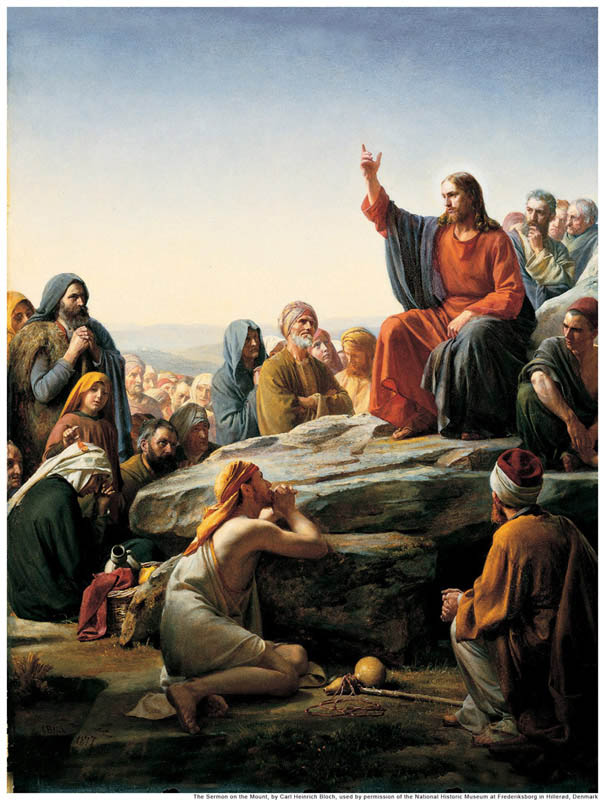How to Want to Follow Christ
A Mighty Change—How Humility, Gratitude and Love Bring Us Closer to Christ
Ed Pinegar’s 2015 Book in Review: If each of us were to recognize the need to change, repent, and make the course corrections needed in our lives, the Gospel would truly be an unstoppable force for good, not only in and for our own lives, but as an influence for greater good to help anyone we meet in life. It would allow all of us to see how much we truly need Christ in our lives. In the Introduction of A Mighty Change, published by Covenant Communications, Brother Pinegar, author of more than 60 books, audio books and talks, explains how change and becoming are synonymous from a gospel-centered perspective. Repentance, Becoming, and Perfection all require Change.
He reminds us of the simple question Christ asks of us, found in 3 Nephi 27:27: “What manner of men ought ye to be? I say unto you, even as I am.” By focusing on Three Eternal Truths that we need to learn how to overcome, as necessary steps for growth, he takes us through the process teaching us how to recognize the Elements of Change and then incorporate these principles into our lives. These truths are: The Law of Opposition, Temptation, and Agency.
Experiencing Pain

Brother Pinegar explains that as part of God’s plan for our lives, we find that Pain is part of the Law of Opposition. It comes in many forms: as a warning — physical, mental and emotional — or a form of protection from further pain. It enables us to grow by forcing us to reach for answers, gives us power to empathize, and to seek release or freedom by calling upon God.
What we learn from the experience of facing pain brings us to finding forgiveness, inner strength, and peace, which leads us to the point where we allow ourselves to be nurtured and blessed. The answer as to why Opposition is required in all things, can be found in 2 Nephi 2:11, 13. Opposition provides us with opportunities of choice and to utilize our agency; for “all things have been done in the wisdom of him (God) who knoweth all things” (2 Nephi 2:24).
The blessings which come through the refiner’s fire of experiencing opposition are our reward and draw us closer to God. Temptations are part of this same Law and allow us the opportunity to chose the Empowering Principles and Doctrines taught in the scriptures to both avoid and overcome them. Past experiences, value systems and attitudes all govern our perception and the reality in which we perceive opposition and temptation either authentically or in distorted, negative ways. It’s during these trials of pain that the Lord extends His tender mercies. And, as our perception increases — our knowledge increases.

As we increase in knowledge, we become able to use our Agency; which is ‘acting, rather than being acted upon.’ Agency makes opportunities for growth possible. We should never forfeit our right to choose or to be in control of our lives. Agency is a gift from God and includes responsibility as well as accountability. Blessings or consequences for every decision made or unmade through obedience preserves or destroys that agency.
Grace, the Atonement and the Holy Ghost
Brother Pinegar uses the headline in chapter two: It all begins with Grace. He explains that the Atonement is the expression of the grace of God and of Jesus Christ the Lord. It’s through the Holy Ghost’s power and gifts, that lead us to do good and make The Mighty Change. It’s imperative that we receive the gift of the Holy Ghost, so we may feel the spirit constantly, as we strive to implement these changes toward becoming perfected in Christ.
Grace and the Atonement are the enabling powers of all things; through them, the Lord is able to nurture and bless us with His power.
Ed Pinegar, p.46
Brother Ed also states that a reevaluation of life is key to change, and uses Proverbs 3:5-6 as the key to doing this. He concludes this chapter by giving a brief list of how to enjoy the blessings of the Holy Ghost. An attitude of gratitude and development of humility is the focus of chapter three and leads directly to chapter four’s review of King Benjamin’s Sermon and the example the Book of Mormon king set for us. Brother Pinegar introduces the 6 Elements of Change here, and explains them in greater detail and depth, in the subsequent chapters. Reading through each sub-heading and topic within each chapter makes it easy to understand all that is involved in learning about each element.
The 6 Elements to Change

As each Element to Change is introduced thoroughly to us by Brother Pinegar, we learn about Faith, the Word of God and applying the scriptures in our lives. We come to understand that to be able to change we must first feel a need to change. Understanding our Divine Nature enables a more rapid change and shows us the worth of souls. We must learn to act and not be acted upon, to act in faith, to choose to act, and learn to accept the Doctrine of Receiving.
By embracing God’s value system for our lives and not values based on false premises, we gain understanding of the mysteries of God. The ‘Beatitudes’ found in the New Testament’s Book of Matthew, help us create this new value system. The Lord has given us the way, by and through His Word. When we’ve developed our new Christ-like value system we become more committed to God, converted to Christ our Savior. Then, we become prepared to make our covenants with the Lord.
A Challenge with a Great and Last Promise
We are encouraged to re-read Mormon’s Farewell Epistle and Letter to his son Moroni found in Moroni 9:25-26 as well as his Farewell to all people in the following verses 32-33. Then, to finish our study by reading from the Doctrine and Covenants 88:67-69. This scripture is considered the be ‘The Great and Last Promise’. In his final chapter, helping others change, is found the final piece of instruction that Brother Pinegar suggests we need to learn. If we’ve learned the principles which enable us to make the Mighty Change, we should be in a position to help others make it as well.
We must be personally prepared, look outside ourselves and ask the ‘W’ questions: Who, What, When, Where and How. If we’re to be instruments in God’s Hands, we understand how to gain others’ trust and help them feel the need to change. We can help them build self worth, prepare to learn, then choose to act and not be acted upon. As we seek to help others, we must assist them in learning to change their values, and make and keep commitments by gaining their trust and respect first. Before they can do anything, they must feel the need to change.

To do these things there are a few things for us to remember: we need to love them, relate to their level of faith and understanding, utilize the power of the Holy Ghost to motivate, show conviction, and suggest how to apply the principles in their lives. We’ll maintain our credibility if we teach by the Holy Ghost and pray to understand their individual needs. These are the things we should do for ourselves, as we make The Mighty Change. To love our neighbors as ourselves, we must remember to learn and teach by the Spirit. It’s the Spirit that carries Truth; we’re only the instruments of His Hands.
Brother Pinegar’s book is written in a straightforward conversational teaching style, but there’s a lot of information, counsel, truth and simple doctrine built into each section within the chapters. He has utilized years of teaching experience and put it into book form as an individual study program.
 It’s a book to read section by section, or chapter by chapter, as if taking an Institute class. Take time to think about each before progressing; as if preparing for the next hour of instruction in his classroom. If we apply ourselves, we can’t help but begin to make the Mighty Change, as we learn by first reading, then meditating upon each section and finally putting into place each element, one by one, into our lives.
It’s a book to read section by section, or chapter by chapter, as if taking an Institute class. Take time to think about each before progressing; as if preparing for the next hour of instruction in his classroom. If we apply ourselves, we can’t help but begin to make the Mighty Change, as we learn by first reading, then meditating upon each section and finally putting into place each element, one by one, into our lives.


